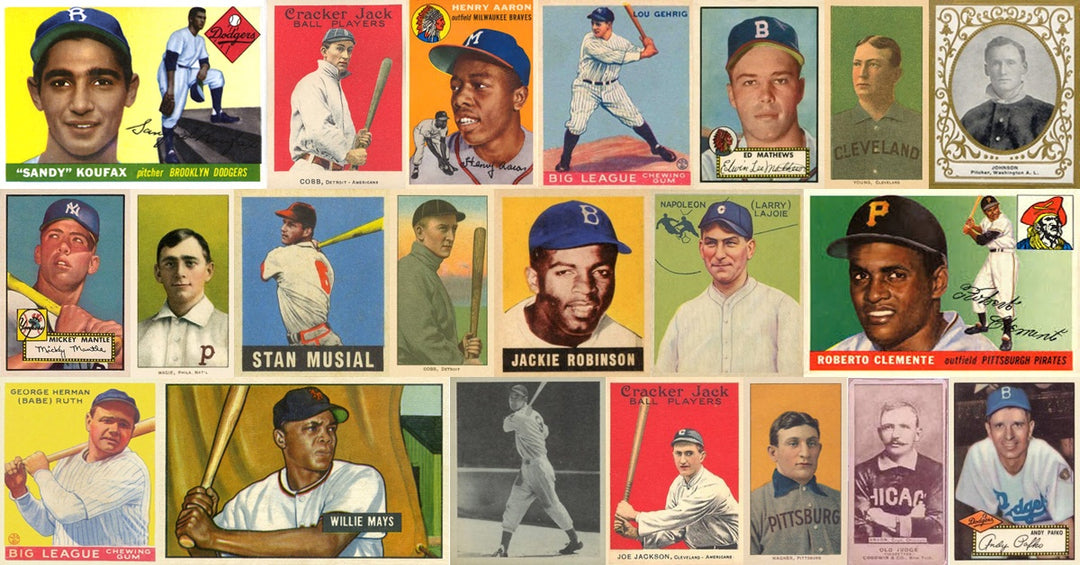Will Sports Cards Go Up In Value?

Hey there, sports fans! Today, we’re diving into an exciting topic that’s sure to get your adrenaline pumping: the value of sports cards. Now, you might be wondering, will sports cards go up in value? Well, grab your favorite jersey and let’s find out!
Whether you’re a die-hard collector or just someone curious about the world of sports cards, this article is for you. We’ll explore the factors that can influence the value of sports cards and whether they’re likely to appreciate over time. So, buckle up and get ready for a wild ride through the exhilarating world of sports card collecting!

Will Sports Cards Go Up in Value?
As sports card collecting continues to grow in popularity, many collectors are wondering whether their cards will increase in value over time. With the rise of online marketplaces and the emergence of new collectors, the sports card market has experienced significant growth in recent years. This article will explore the factors that can affect the value of sports cards and provide insights into the potential for appreciation.
The Popularity of Sports Card Collecting
Sports card collecting has become a mainstream hobby, attracting not only seasoned collectors but also a new generation of enthusiasts. The surge in interest can be attributed to various factors, including the nostalgia associated with sports, the thrill of collecting rare and valuable cards, and the potential financial gain. The demand for sports cards has skyrocketed, with rare and graded cards commanding high prices in the market.
One of the key drivers of the sports card market is the emergence of online marketplaces, which have made it easier for collectors to buy, sell, and trade cards. Platforms like eBay and StockX have revolutionized the way collectors interact, offering a global marketplace and facilitating transactions with ease. The accessibility and convenience provided by these platforms have contributed to the growth of the sports card market.
The Factors Affecting Sports Card Value
Several factors can influence the value of sports cards. These include the player’s performance and popularity, the card’s condition and rarity, and the overall demand in the market. Let’s take a closer look at each of these factors:
Player’s Performance and Popularity: The performance of the athlete depicted on the card plays a significant role in determining its value. If a player achieves notable successes or breaks records, their cards are likely to appreciate in value. Additionally, players who are highly popular among fans and collectors may also see an increase in the value of their cards.
Card Condition and Rarity: The condition of a sports card is crucial in determining its value. Cards in pristine condition, free from any damage or wear, are highly sought after by collectors and can command premium prices. Rarity is another essential factor. Limited edition or special release cards are often more valuable due to their scarcity.
Market Demand: The overall demand for sports cards can significantly impact their value. Collectors’ demand for specific players, teams, or sets can drive up prices in the market. Trends and market sentiment can also play a role in determining which cards are in high demand. Staying informed about the latest trends and developments in the sports card market can help collectors make informed decisions.
The Potential for Appreciation
While there are no guarantees in the world of sports card collecting, there is certainly potential for appreciation in card values. The combination of factors such as player performance, card condition, rarity, and market demand can contribute to the increase in value over time.
It’s important to note that sports card collecting should be approached as a long-term investment. Just like stocks or other collectible assets, sports cards may experience fluctuations in value. However, if you carefully select cards based on the factors mentioned above and keep an eye on market trends, you may be able to capitalize on the potential for appreciation.
Benefits of Sports Card Collecting
Engaging in sports card collecting offers various benefits beyond the potential for financial gain. Collecting sports cards allows individuals to connect with their favorite athletes and relive memorable sports moments. It provides a tangible link to the sports world, allowing collectors to own a piece of history. Additionally, sports card collecting can foster a sense of community among collectors, providing opportunities for networking, trading, and sharing knowledge.
It’s important to approach sports card collecting with a passion for the hobby rather than solely focusing on the financial aspect. While there are undoubtedly valuable cards in the market, the true enjoyment lies in the process of collecting, researching, and connecting with fellow enthusiasts.
Tips for Sports Card Collectors
If you’re considering entering the world of sports card collecting or are already an avid collector, here are a few tips to enhance your collecting experience:
- Research and stay informed about the latest trends and developments in the sports card market.
- Focus on collecting cards of players or teams that resonate with you personally.
- Pay attention to the condition and rarity of cards when making purchasing decisions.
- Connect with other collectors through online forums, social media groups, or local meetups.
- Consider professional grading services to ensure the authenticity and quality of your cards.
- Explore different eras and sports to diversify your collection.
By following these tips and immersing yourself in the world of sports card collecting, you can enhance your collecting experience and increase your knowledge and appreciation for this fascinating hobby.
Main Topic Heading After the Main Topic
After exploring the potential for sports card appreciation and providing tips for collectors, it’s worth considering additional aspects of the hobby. From the thrill of opening packs to the various types of sports card sets available, there is much more to discover in the world of sports card collecting.
The Thrill of Opening Packs
One of the most exciting moments for sports card collectors is the act of opening packs. Whether it’s the anticipation of finding a highly sought-after rookie card or the joy of discovering a card featuring your favorite player, the experience of opening packs is unparalleled. Each pack holds the potential for a valuable or rare find, making it a thrilling activity for collectors.
When opening packs, it’s essential to approach it with a mix of excitement and patience. Not every pack will contain a valuable card, but the joy is in the process itself. Embrace the surprises and enjoy the thrill of collecting.
Types of Sports Card Sets
Sports card sets come in various forms, each catering to different collector preferences. Here are a few popular types of sports card sets:
- Base Sets: These sets feature the primary collection of cards for a specific sports season or league. They often include cards of both established players and rookies.
- Insert Sets: Insert sets offer additional cards within a base set, featuring unique designs or themes. These cards can be more limited in quantity and may include special features like autographs or pieces of game-worn memorabilia.
- Parallel Sets: Parallel sets provide alternative versions of base set cards with different designs or limited editions. These sets can be highly sought after by collectors looking for rare variations.
- Special Edition Sets: Special edition sets are released to commemorate specific events, milestones, or anniversaries. These sets often feature unique designs and may include special inserts or autographed cards.
Exploring different types of sports card sets allows collectors to diversify their collections and cater to their specific interests. Whether you prefer collecting base sets or are on the hunt for rare inserts, there’s a set out there for every collector.
Final Thoughts
As the sports card market continues to evolve and grow, the potential for appreciation in card values remains. While there are no guarantees, the combination of factors such as player performance, card condition, rarity, and market demand can contribute to the increase in value over time.
However, it’s important to approach sports card collecting with a genuine passion for the hobby and an appreciation for the process of collecting. The joy of connecting with favorite athletes, reliving sports moments, and building a community of fellow collectors is what truly makes the hobby special.
So, whether you’re a seasoned collector or a newcomer to the world of sports card collecting, embrace the excitement, stay informed, and enjoy the journey of collecting cards that hold both sentimental and potential value.
Key Takeaways: Will Sports Cards Go Up in Value?
- Sports cards have the potential to increase in value over time.
- Factors such as player performance, rarity, and demand can influence card prices.
- Collectors and investors can track card values through online platforms and price guides.
- Historical trends show that some sports cards have experienced significant appreciation.
- However, it’s important to research and make informed decisions before investing in sports cards.
Frequently Asked Questions
Why do sports cards increase in value?
Sports cards increase in value for several reasons. One of the main factors is the demand from collectors and fans. As players achieve significant milestones or break records, their cards become more sought after. Additionally, limited-edition cards or cards featuring rare player autographs can also drive up their value.
Another reason for the increase in value is the condition of the card. Cards that are in mint condition or have been professionally graded tend to fetch higher prices in the market. The scarcity of certain cards can also contribute to their value. If there is a limited supply of a particular card, collectors are willing to pay a premium to add it to their collection.
Can sports cards retain or lose their value?
While sports cards have the potential to increase in value, it is important to note that they can also lose value. Market trends, player performance, and shifts in collecting preferences can all impact the value of sports cards.
If a player’s performance declines or they suffer from injuries, the demand for their cards may decrease, leading to a decrease in value. Similarly, if a particular type of card or collecting trend falls out of favor, the value of those cards may also decrease. It is important for collectors to stay updated on market trends and make informed decisions to maximize the potential value of their sports cards.
Are sports cards a good investment?
Investing in sports cards can be a lucrative venture, but it also comes with risks. The value of sports cards can fluctuate based on various factors, including the performance of players, market trends, and overall demand. It is crucial for investors to conduct thorough research and stay informed about the sports card market before making any investment decisions.
While some sports cards have seen significant increases in value over the years, it is important to remember that past performance is not always indicative of future results. Collecting sports cards can be a rewarding hobby, but it is important to approach it with realistic expectations and a long-term mindset.
How can I determine the value of a sports card?
Determining the value of a sports card can be a complex process. Several factors come into play, including the player’s popularity and performance, the rarity of the card, its condition, and current market demand.
One way to assess the value of a sports card is by consulting price guides and online marketplaces. These resources provide insights into recent sales and can give you an idea of what similar cards are being sold for. Additionally, getting a card professionally graded can also impact its value, as higher grades generally result in higher prices.
What should I consider when buying sports cards as an investment?
When buying sports cards as an investment, there are several factors to consider. Firstly, research the players and their potential for future success. Look for young, up-and-coming players or established stars who have a strong fan base.
Next, consider the condition and rarity of the cards you are interested in. Mint condition cards or those with limited availability tend to have higher potential for value appreciation. Additionally, staying updated on market trends and collecting preferences can help you make informed decisions about which cards to invest in.
Will These Sports Cards Go Up In Value?
Final Thoughts
So, will sports cards go up in value? It’s a question on the minds of collectors and investors alike. While there are no guarantees in the world of sports card collecting, there are certainly factors that can influence their value.
One key factor is the popularity and demand for the sport and the players featured on the cards. As athletes achieve new milestones and capture the attention of fans, their cards can become more sought after. Additionally, scarcity plays a role in determining value. Limited edition cards or ones with low print runs can fetch higher prices due to their rarity.
Another factor to consider is the condition of the cards. Mint condition cards, free from any damage or wear, are highly desired by collectors and can command higher prices. Taking care of your cards and storing them properly can help maintain their value over time.
But perhaps the most important aspect to remember is that sports card collecting should be enjoyed for the passion and love of the hobby, rather than solely for financial gain. While it’s possible for sports cards to increase in value, it’s important to collect what you love and appreciate the memories and stories behind each card.
In conclusion, while there are no guarantees, sports cards have the potential to go up in value. By considering factors such as popularity, scarcity, and condition, collectors and investors can make informed decisions. However, it’s essential to remember that the true value lies in the joy and memories that come with being a part of the sports card collecting community.






